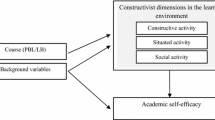Abstract
The effects of a constructivist approach on academic achievement, self-concept and learning strategies, and student preference were investigated. The 76 six graders were divided into two groups. The experimental group was taught using the constructivist approach while the control group was taught using the traditional approach. A total of 40 hours over nine weeks was used to implement the experiment. The instruments used were as follows; mathematics tests administered by the teacher, self-concept inventory, learning strategies inventory, and a classroom environment survey. The results are 1) constructivist teaching is more effective than traditional teaching in terms of academic achievement; 2) constructivist teaching is not effective in relation to self-concept and learning strategy, but had some effect upon motivation, anxiety towards learning and self-monitoring; 3) a constructivist environment was preferred to a traditional classroom.
Similar content being viewed by others
References
ASCD (1995).Constructivism facilitator’s guide. Alexandria, Va: Association for Supervision and Curriculum Development
Brooks, J.G., Brooks, M.G. (1993).The case for constructivist classrooms. Alexandria, Va.: Association for Supervision and Curriculum Development.
Dewey, John (1916).Democracy and education. New York: Macmillan
Jonassen, D. H. (1990). Thinking technology: Chaos in Instructional Design.Educational Technology. 30(2), 32–34.
Kant, Immanuel S. (1781). Rev.(1999).The critics of reason. London: Cambridge University Press
Kim, Hibae (1993). Telesis Investigations I for Academic Identity of Educational Technology.Korean Educational Technology, 8(1), 121–133.
Kim, Jongsuk (1997).Constructivist teaching workshop. Taejon: Educational Technology Workshop Center, Chungnam National University.
Kim, Jongsuk (2002), The effects of teacher training as constructivist on teacher behavior and student achievements.Faculty Research Papers on The Study of Education. 18(2) Educational Development Research Institute, Chungnam National University.
Kuhn, Thomas (1962).The structure of scientific revolution. Chicago: University of Chicago Press.
Piaget, Jean (1976). To understand is to invent: The future of the education. New York: Penguin Books
Von Glasersfeld, E. (1989). Cognition, construction of knowledge and teaching.Syntheses. 80(1), 121–140
Von Glasersfeld, E. (1993), Learning and adaptation in the theory of constructivism,Communication and Cognition, 26(3), 393–402
Weinstein, C.E. & Mayer, R.E. (1986). The teaching of learning strategies. In Wittrock, M.C. (Eds.)Handbook of Research on Teaching. New York: Macmillan, 315–327.
Vygotsky, L. S. (1978)Mind in Society. Cambridge, MA.: Harvard University Press.
Yager, R.E. (1991). The Constructivist learning model: Toward real reform in science education.The Science Teacher, 56(6), 52–57.
Author information
Authors and Affiliations
Corresponding author
Rights and permissions
About this article
Cite this article
Kim, J.S. The effects of a constructivist teaching approach on student academic achievement, self-concept, and learning strategies. Asia Pacific Educ. Rev. 6, 7–19 (2005). https://doi.org/10.1007/BF03024963
Received:
Revised:
Accepted:
Issue Date:
DOI: https://doi.org/10.1007/BF03024963




